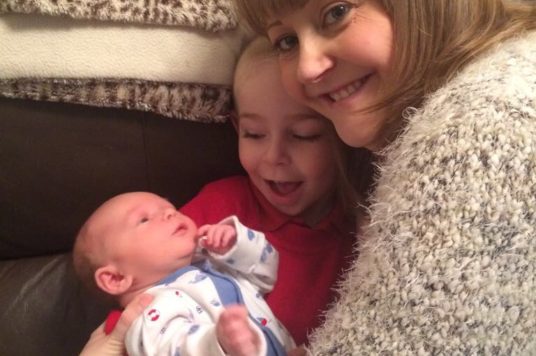Team of 22 save woman and her unborn baby at St George’s
A 22 strong team of medical and surgical staff at St George’s Hospital has saved the life of a mother and her unborn baby after a major heart and aortic defect was detected during screening.
Julie Fisher, 36, who works for a transport company in Newbury, underwent an emergency caesarean section at St George’s followed by major open heart surgery in February this year.
Julie was rushed to St George’s after doctors at her local hospital detected a life-threatening problem with her aorta, the main artery which supplies blood to the body.
Julie was 37 weeks pregnant when she visited her GP complaining of dizziness. She was referred to the Royal Berkshire Hospital, where doctors – during screening – identified a dissection or ‘tear’ in her aorta, which is a fatal condition if left untreated.
Julie was immediately transferred by ambulance to St George’s, where medical and surgical teams decided the only option was for her to undergo an emergency Caesarean section, followed immediately by surgical repair of her aortic valve and replacement of her aorta.
The surgery involved the obstetric and gynaecology team at St George’s first performing an emergency Caesarean section. Julie’s son Jake was delivered in a healthy condition, but was taken to the neonatal unit as a precaution.
Then, under the same anaesthetic and in the same operating theatre, the cardiac surgical team at St George’s took over, and Julie-Ann underwent successful open heart surgery which took 5 hours to complete.
She was then transferred to intensive care, before being reunited with Jake and husband David back on the ward. She and Jake were discharged home after 6 days, and both are doing well.
Her condition carried major risks – less than 50% of patients survive the initial six hours following a tear of the aorta and make it to hospital. The risk of surgery is also great, with a 30% chance of the mother dying during surgery, and 10% for the unborn baby.
Julie said: “It was really frightening and, in a matter of minutes, my world turned upside down. The doctors in Reading wouldn’t even let me move from the bed to go to the bathroom because they were so worried I would suffer a heart-attack. And then, suddenly, I was being transferred to St George’s, where I went straight to the operating theatre. It all happened so quickly.”
She continued: “Jake and I are so lucky, and grateful to the teams at both St George’s and the Royal Berkshire who looked after us. Jake is a perfect little boy, and I feel genuinely lucky to be alive.”
Marjan Jahangiri, Professor of Cardiac Surgery, performed the operation to repair Julie’s heart valve and replace her aorta.
She and her team were supported by Basky Thilaganathan, Professor of Foetal Medicine; Dr Renate Wendler, Consultant Anaesthetist; Mr Simon Philips, Chief Perfusionist; plus a large team of medical, surgical and nursing staff, who assisted during both operations.
Professor Jahangiri said:
“Julie’s case shows the importance of providing specialist care in the right place, at the right time. St George’s is one of few centres equipped to treat emergency conditions of the aorta during pregnancy, which is why she was transferred to us for treatment.”
“Her case also shows the importance of team work – between clinical specialities, but also different hospitals. Both Julie and her unborn baby were in serious danger, so we are all delighted they are now doing so well.”
Notes to editors
For more information, please contact Pippa Harper, Media Manager, via 020 8725 4521 or philippa.harper@stgeorges.nhs.uk


